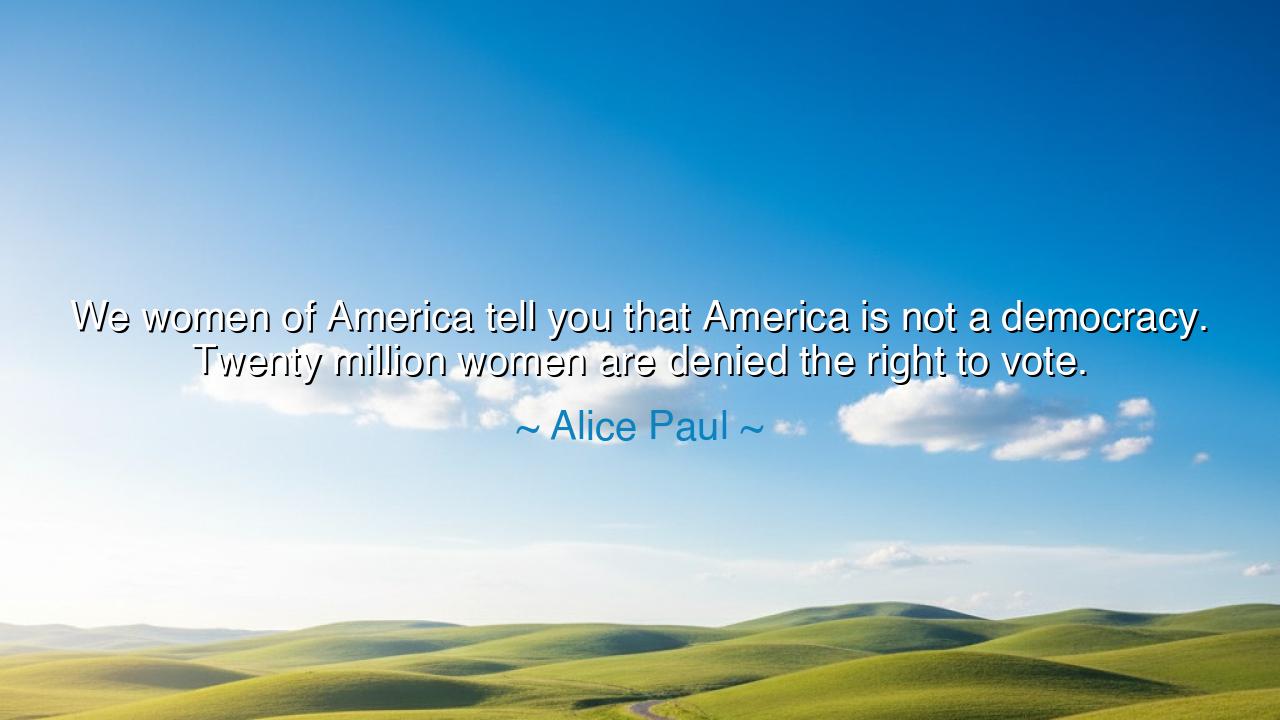
We women of America tell you that America is not a democracy.
We women of America tell you that America is not a democracy. Twenty million women are denied the right to vote.






Alice Paul, warrior of suffrage and architect of justice, once thundered: “We women of America tell you that America is not a democracy. Twenty million women are denied the right to vote.” These words struck like a hammer against the marble pillars of power, shattering the illusion that freedom had already been secured. For what is a democracy if half the people are silenced? What is liberty if it is chained by sex? In this bold declaration, Paul named the hypocrisy of a nation that proclaimed equality while denying it to its daughters.
The origin of this cry arose in the early 20th century, when women stood outside the White House, banners raised, demanding the franchise. Alice Paul, with unyielding courage, led the National Woman’s Party in protest, hunger strikes, and imprisonment. Her words were not crafted for comfort but for confrontation. They reminded men of power that as long as twenty million women were barred from the ballot, America’s claims of liberty were hollow, its Constitution a promise unfulfilled.
History testifies to the weight of this truth. In 1917, Paul and her Silent Sentinels picketed the White House even as the nation fought for “democracy abroad” in World War I. Arrested, beaten, and force-fed in prison, she and her sisters bore their suffering as proof of America’s betrayal. Their defiance made clear the meaning of her quote: the right to vote is not a privilege granted by benevolence, but a demand of justice, without which democracy itself is a lie.
The struggle was not without triumph. In 1920, the Nineteenth Amendment was ratified, granting women the right to vote. What once was Paul’s accusation became the foundation of victory. Her words, spoken in defiance, had planted the seeds of change, showing that the voice of a few courageous women could awaken the conscience of a nation.
Therefore, O children of liberty, let this wisdom endure: democracy is not proclaimed—it is proven. It cannot exist while millions are silenced. Alice Paul’s cry is a warning across the ages: whenever one group is barred from the ballot, the republic is wounded. For a democracy that excludes is no democracy at all, but a shadow of tyranny disguised in noble words.






QNQuynh Nhu
Alice Paul’s quote stands as both a historical critique and a powerful call for change. It forces us to reconsider what we consider a 'democracy.' If such a large portion of the population, specifically women, were excluded from the voting process, can we say the country was truly democratic? It reminds us that democracy isn’t just about laws; it’s about ensuring everyone has a voice, regardless of gender.
BVBien Vo
Alice Paul’s words expose a shocking reality: how can a country be called a democracy when millions of women were denied basic rights like voting? The glaring inequality that she speaks of raises important questions about the true nature of democracy and who gets to shape it. How many struggles for equality have gone unnoticed because the power to vote was denied to a significant portion of the population?
TNNguyen Vo Thanh Nhi
Alice Paul’s quote reflects the frustration and injustice women faced in the early 20th century. Her statement makes it clear that democracy isn’t just a matter of political systems, but of equal participation for all people. By denying women the right to vote, how could America claim to be a democracy? Her words echo the need for true equality and the ongoing fight to secure the rights of marginalized groups.
TTri
This quote really makes you think about the idea of democracy—what good is a system where some people are systematically excluded? Alice Paul’s comment is not just a historical observation; it’s a broader critique about who gets to participate in a democracy. Could we ever truly call a society democratic if half its population is disenfranchised? It’s a stark reminder of how hard-won rights are and how easily they can be taken for granted.
TNTuyen Ngoc
Alice Paul’s statement is both a call to action and a stark reminder of the deep-rooted gender inequality in early 20th century America. Her assertion that America is not truly a democracy because women were denied the right to vote is a powerful critique of the country's system at the time. How much longer could this denial have continued if women had not fought so fiercely for their rights? What can we learn from their perseverance today?